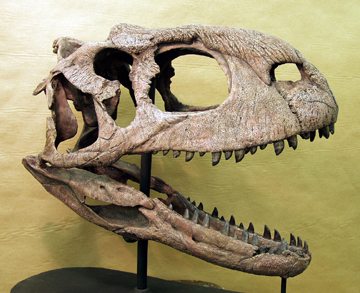
Geotimes Home | AGI Home | Information Services | Geoscience Education | Public Policy | Programs | Publications | Careers

 Last
year, China was once again in the news for an exciting fossil discovery —
the oldest known marsupial, or pouched mammal. Dubbed Sinodelphys szalayi
by Zhe-Xi Luo and colleagues (Science, v. 302, p. 1934-1940), the fossil
consists of a nearly complete articulated skeleton from the 125-million-year-old
Yixian formation, which also produces the earliest placental mammal. Sinodelphys
is 50 million years older than the oldest previously known marsupial fossil. Its
skeleton is mouse-sized, but shows adaptations for climbing and tree dwelling.
This specimen pushes the divergence between marsupials and placentals back to
the Early Cretaceous, and suggests that both groups originated in Asia.
Last
year, China was once again in the news for an exciting fossil discovery —
the oldest known marsupial, or pouched mammal. Dubbed Sinodelphys szalayi
by Zhe-Xi Luo and colleagues (Science, v. 302, p. 1934-1940), the fossil
consists of a nearly complete articulated skeleton from the 125-million-year-old
Yixian formation, which also produces the earliest placental mammal. Sinodelphys
is 50 million years older than the oldest previously known marsupial fossil. Its
skeleton is mouse-sized, but shows adaptations for climbing and tree dwelling.
This specimen pushes the divergence between marsupials and placentals back to
the Early Cretaceous, and suggests that both groups originated in Asia.  |
Geotimes Home | AGI Home | Information Services | Geoscience Education | Public Policy | Programs | Publications | Careers |